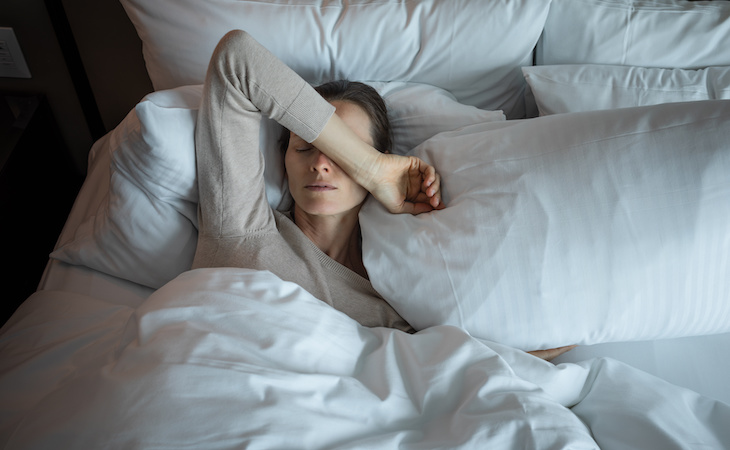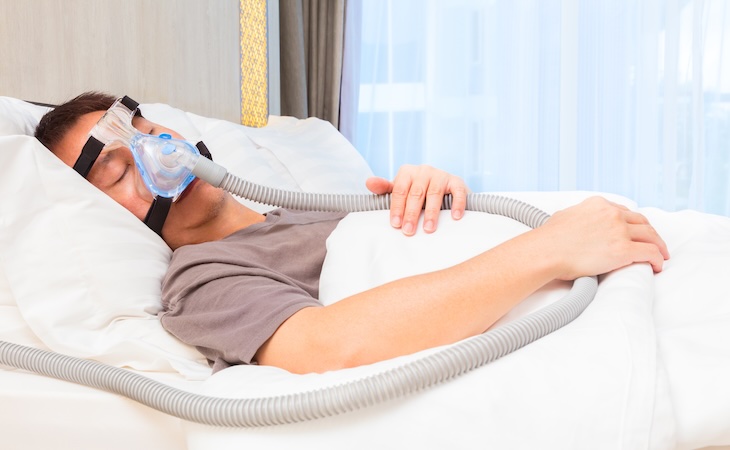News headlines shout almost daily about the public health crisis of opioid misuse and addiction in America. In 2017 alone, more than 47,000 Americans died as a result of an opioid overdose, including prescription opioids, heroin, and illicitly manufactured fentanyl, a powerful synthetic opioid, the National Institute on Drug Abuse (NIDA) reports.
According to the NIDA, roughly 21% to 29% of patients prescribed opioids for chronic pain misuse the drugs, and more than 130 people in the United States die each day after overdosing on an opioid.
One aspect of opioid use and misuse you don’t hear about quite that often is how it affects sleep. For some living with chronic pain, opioids can bring much-needed rest—but that’s not the case for everyone.
“Some people get better sleep when they take opioids because their sleep is disrupted by pain,” says Kathryn A. Boling, MD, a Maryland primary care physician with Mercy Personal Physicians at Lutherville. “But others find opioids interfere with their sleep.”
How do opioids affect your sleep?
Opioids bind to dopamine (“reward”) receptors in your brain, signaling the release of this so-called “feel-good” neurotransmitter. Long-term use can rewire your brain’s circuitry, leading to such symptoms as insomnia, difficulty falling or staying asleep, feeling that sleep wasn’t restful, daytime sleepiness, vivid and even disturbing dreams, and rapidly fluctuating emotions.
A study at St. George’s Hospital Medical School in London found opiate users were more than five times likelier to report difficulty falling asleep and nine times likelier to say they didn’t get good or enough sleep. (Opiate is the term used to describe a drug naturally derived from the opium poppy plant, like heroin and morphine.)
Even single doses of oral opioid medications can significantly affect sleep architecture in healthy adults, according to another study from UC-San Diego. They can decrease REM and slow-wave sleep (“deep sleep”) by as much as 50%, and increase the lighter phases of sleep.
The researchers suggest that although study participants didn’t report feeling significantly more fatigued from the one-time dose, its disruption of their sleep architecture may suggest why long-time opioid users commonly experience fatigue.
Related: How vaping messes with your sleep
Can opioid use lead to sleep conditions?
Besides changing sleep architecture and reducing deep sleep, prolonged opioid use contributes to several conditions that can keep the vicious circle of pain, poor sleep, and opioid dependence going around (since impaired sleep in itself is known to exacerbate pain).
Opioids contribute to the following four different types of sleep problems:
Insomnia
Insomnia is repeated difficulty falling and staying asleep. People taking opioids long-term experience sleep deprivation because medication side effects keep them from falling asleep, staying asleep, or getting restful sleep. (Here’s why you might experience insomnia after surgery.)
Parasomnia
Parasomnia includes a group of sleep disorders, such as sleep-walking and REM Sleep Behavior Disorder, that disrupt sleep and can lead to sleep deprivation. Opioids interfere with sleep patterns and can cause individuals to engage in abnormal behaviors during sleep that are associated with these disorders.
Daytime sleepiness or Shift-Work Disorder
Shift-Work Disorder, or daytime sleepiness, results from disordering the body’s sleep-wake cycle known as the circadian rhythm. Opioids’ sleep-disrupting effects can make someone feel intensely fatigued and lead to the irregular sleep times that contribute to this disorder.
Sleep apnea and disrupted breathing patterns
Prolonged opioid use is well-known to contribute to developing sleep apnea, a condition in which the sleeper actually stops breathing, hundreds of times, during the night. A study reported in the Journal of Clinical Medicine found that 46% of the opioid users in their sample had severe sleep apnea, and 71% had moderate sleep apnea. That said, it’s important to note that the opioid patients with sleep apnea in the study also were at increased risk because they were significantly overweight, a main contributor to the condition.
Still, even if someone isn’t experiencing sleep apnea per se, opioids can still alter and cause dysfunction in breathing patterns. In fact, sites in the brain that control breathing rhythms are particularly sensitive to opioids.
How do you get better sleep while taking opioids?
Fortunately, there are things you can do if you must take opioids. Boling recommends that her patients taking opioid medications follow similar guidelines as people with insomnia.
For starters, you should pay attention to the time you take the opioid and move the dose around a little bit depending on when your bedtime is. She also recommends doing relaxing activities before bedtime.
Boling adds that she lets her patients use melatonin along with an opioid, however not all doctors do, so it’s best to talk with your MD before adding any sleep supplement to your routine. (Here’s what you need to know about melatonin.)
If you have sleep issues because of taking opioids, there are other things you can do as well to help manage opioid-induced sleep disorders:
- Regular exercise can help maintain your energy level.
- Regular bedtime and wake-up times keep your circadian rhythm synced.
- Avoid or at least learn how to manage stress.
- Eat nutritious food to improve your overall health, including your sleep.
How do you stop using opioids?
Quitting “cold turkey” is not the way to scale back or stop taking these powerful medications—not least of all because one of the side effects of doing so is disturbed sleep.
“If you’re coming off of opioids,” says Boling, “you might have disruption in your sleep, especially if you stop abruptly and you have been taking it a long time. I try to have my patients taper off.”
She says that anyone who has been taking opioids for an extended time and wants to stop should first talk to their doctor. “The doctor may have advice for what they could take as they’re tapering to help with their pain,” says Boling. “Can they take Tylenol? Ibuprofen? It’s definitely something to discuss with their doctor who can advise them on what to do.”
Here are some helpful resources for opioid users:
- Substance Abuse and Mental Health Services Administration National Helpline
- OpioidHelp.com
- HelpGuide: Opioid Addiction
Alcohol can also affect your sleep. Here, learn how alcohol messes with your sleep—and what to do about it.




